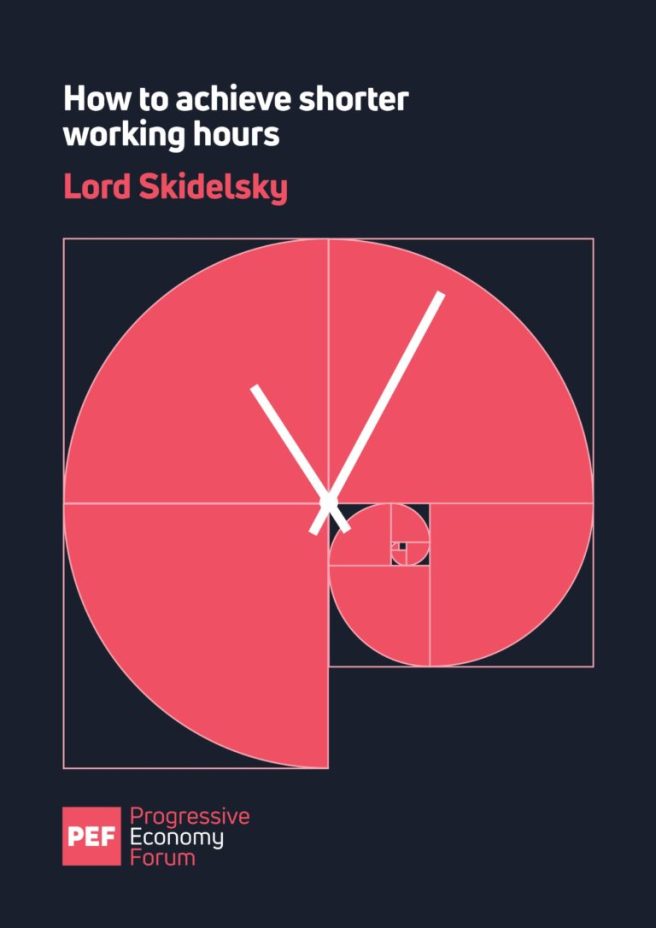Report advocates shorter working hours for improved well-being
Posted on 19 Sep 2019 Categories: New economic models, News, Reports, The society we want, The state we want, Wellbeing, Work
 A new report, How to achieve shorter working hours, commissioned by the Labour Party and written by Lord Skidelsky, was published last week. It argues that ‘a reduction in hours of necessary work should be a natural and desirable outcome of a progressive society’.
A new report, How to achieve shorter working hours, commissioned by the Labour Party and written by Lord Skidelsky, was published last week. It argues that ‘a reduction in hours of necessary work should be a natural and desirable outcome of a progressive society’.
Full-time workers in the UK work on average 42.5 hours a week, more than in any EU country other than Greece and Austria. The report argues that ‘even though some people are compelled to work shorter hours than they want to, most people are compelled to work longer hours than they want to’. Skidelsky claims that having to work less for a living ‘is good for material and spiritual well-being’, and that automation – which ‘brings about an increase in output per unit of effort’ should, in theory, enable working hours to fall. However, despite productivity growth and advances in technology, hours of work have not fallen spontaneously. As Skidelsky points out, automation is in fact often viewed as a ‘threat to jobs’. He goes on to say that
‘whether automation turns out to be a blessing or a curse depends on the speed and conditions of its ‘roll-out’, and the distribution of wealth, income, and life chances which accompany it. These are, or should be, matters of social choice.’
Historically, the push for higher wages and shorter hours came from a combination of government and trade unions; the government’s role was to maintain full employment, while unions were in a strong position to negotiate with employers. Government has since abandoned this commitment, and union power has been weakened over the years. The report argues that due to wage stagnation, increased job insecurity, and the widening gap between earnings has put ‘voluntary choices for hours reduction beyond the reach of increasing numbers of workers’. It calls for government policy interventions ‘explicitly designed to secure reduced working time’, that will
‘need to be directed less to stimulating economic growth and more to promoting security of employment, improved conditions of work, increased organisational efficiency and redistribution of incomes and life chance’.
Skidelsky sets out six policy proposals with the aim of shortening working hours, but as he points out, they are ‘desirable for many reasons’ and could also ‘be used to reduce poverty’ or ‘adapted to the requirements of a ‘Green New Deal’’. He advocates a ‘Job Guarantee Scheme’, with the government acting as an ‘employer of last resort’. The report also calls for heavy investment in the public sector and the ‘use of procurement policies to establish pay, conditions, and hours’. Sectoral social partnership forums could be used to fill the ‘vacuum left by the demise of collective bargaining’, while a statutory duty should be imposed on listed companies to ‘disclose the impact of automation on employment’. Finally, the report recommends improving and enforcing individual time rights and removing ‘the UK’s opt-out provision for the EU Working Time Directive’.
In his summary of the report, Skidelsky describes the ‘spirit’ in which he approached it:
‘Policy should keep constantly in mind the goal of reducing ‘necessary’ labour effort. This, rather than unlimited consumption, was the chief promise of mechanisation. Material wealth is the means to a better life, not the better life itself. We have made the growth of GDP an end in itself-an offence to the gods, but also to the planet whose trustees we are.’
Read the full report here.
Posted on 19 Sep 2019 Categories: New economic models, News, Reports, The society we want, The state we want, Wellbeing, Work
